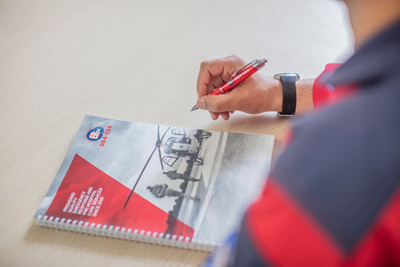Natania Lemley tells us about her role as ER24’s Learning and Development Manager.
How did you get started in this career?
I began as a paramedic at the Western Cape Department of Health, servicing Worcester and the surrounding areas. In 2018, I joined Mediclinic as an Emergency Medical Care (EMC) Development Specialist. This was a new position created to develop clinical and patient experience content for paramedics. In December 2022, I was promoted to EMC Learning and Development Manager.
What does your role entail?
My first task was to get all the ER24 clinical staff trained on the new clinical practice guidelines that came into effect in 2016. I then worked with branch managers and emergency care providers to identify the clinical areas in which we needed to offer more training. These include information and courses in basic pharmacology, cardiopulmonary resuscitation (CPR), basic airway management, critical care fundamentals, and interfacility transfers. We also focus on managing the patient experience and how we support their journey in the healthcare setting. This means receiving training on bedside manner, managing the patient’s family, and diffusing heightened emotions.
What support team do you have?
I oversee four ER24 Learning and Development (L&D) Facilitators. They are the feet on the ground. They work on the road with the emergency care providers and are in contact with the Branch Manager to identify where the knowledge gaps are. I am responsible for the ER24 skills plan, which is critical for ER24’s BBBEE score card and development of new content. Every year, we submit a skills plan to train staff. If we reach 60% of our goal, we’re allocated a skills development grant from the Health and Welfare SETA. My very well-oiled machine of L&D Facilitators trains the operational staff. Together, we form the A team!
How do you work as a team?
We’re a close-knit group, and we check in with each other daily. The team identifies when there’s a need for refresher courses about new medications, new illness outbreaks, new skills, and new equipment, such as ECG monitors, ventilators, and infusion pumps. The L&D team is dynamic, agile, and the team members are experts in their field. They’re hardworking and can easily identify an issue and then find a suitable training solution. I’m based at the Corporate Office in Stellenbosch. The rest of the team is based throughout South Africa within their regions.
Any challenges?
During COVID-19, we realised we needed more online training and started implementing more of these interventions. The challenge is ensuring all our staff members have access to Wi-Fi to access these interventions. We’re working on solving this.
What are the highlights?
Seeing the change in the behaviour of staff and the positive outcomes in patient care because of the training we implemented.
Why did you choose a career in emergency medicine
When I was in Grade 3, I watched a TV series that followed a group of paramedics. From then on, I wanted to be part of the emergency medicine action! As I grew older, I realised that being a paramedic meant so much more than just running after calls and I became more and more interested in our role as emergency care providers, in the bigger scheme of things. Looking back, I now know that we can have a much bigger impact than only treating and transporting the sick and injured, but can change people’s lives by doing the simplest things – and that is why I ultimately chose and stayed in the emergency care setting.


